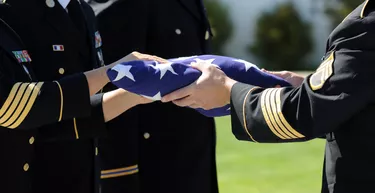
The death of a spouse can be devastating. Even in a time of emotional distress and heartache, the bills don't stop. If your husband was receiving disability benefits through the Department of Veterans Affairs before he died, you can't continue collecting his benefits. However, you may qualify for your own benefits through the VA. Dependency and Indemnity Compensation is a tax-free benefit paid to eligible surviving spouses or children.
Benefits
Video of the Day
DIC is a monthly flat-rate benefit of a base amount determined by Congress, not based on the pay grade or rank of the service member. As of 2014, the base spousal DIC benefit amount is $1,215. You may qualify for an extra $258 a month if your husband was receiving compensation benefits for at least eight years and you two were married for eight years or more. If you have minor children, you may receive an additional $301 monthly for each child. Your unmarried children can receive benefits until they turn 18, or 19 if they are still in high school. If the child attends a VA-approved college or higher learning institution, the benefits can continue through age 23. Children who are disabled can receive benefits for life. If you remarry before age 57, your spousal DIC will end. Death benefits change periodically, so check with the VA for the latest rate.
Video of the Day
Qualifying Survivors
If your spouse was a veteran, you must have been married for at least one year to qualify. If you weren't married for at least a year, you must have a child with the veteran and lived together continuously with the veteran until his death. If you were separated, the separation can't be your fault and you can't have remarried. The VA lists other ways you may qualify as a surviving spouse. If you were married before January 1, 1957 or married within 15 years of the discharge date in which the disease or illness causing the death began, you also can qualify. Widows are also eligible for DIC if they were married to servicemen who died on active duty, active duty for training or inactive training duty.
Necessary Information
You'll need to submit certain documents, including discharge or separation papers, service treatment records and doctor or hospital reports. The application asks what benefits you are applying for and any benefits your spouse was receiving. You'll need to answer questions about your husband, his service, active duty status, your marriage, your children and other dependents and unreimbursed medical or burial expenses. Since the Department of Treasury requires all federal deposits to be made via electronic funds transfer, you'll be asked to provide your bank account number and routing information.
Application Process
After your husband's death, you'll need to apply for benefits to receive them. Complete Form 21-534, "Application for Dependency and Indemnity Compensation, Death Pension and Accrued Benefits by a Surviving Spouse or Child." You can download and print the form available on the VA website and mail it to your regional office. If you need help completing the application or prefer to work directly with a representative or agent, go to your regional office. Use the "Facility Locator" feature to search for an office near you. If your husband's death occurred while in service, a Military Casualty Assistance Officer will help you complete the form and apply.